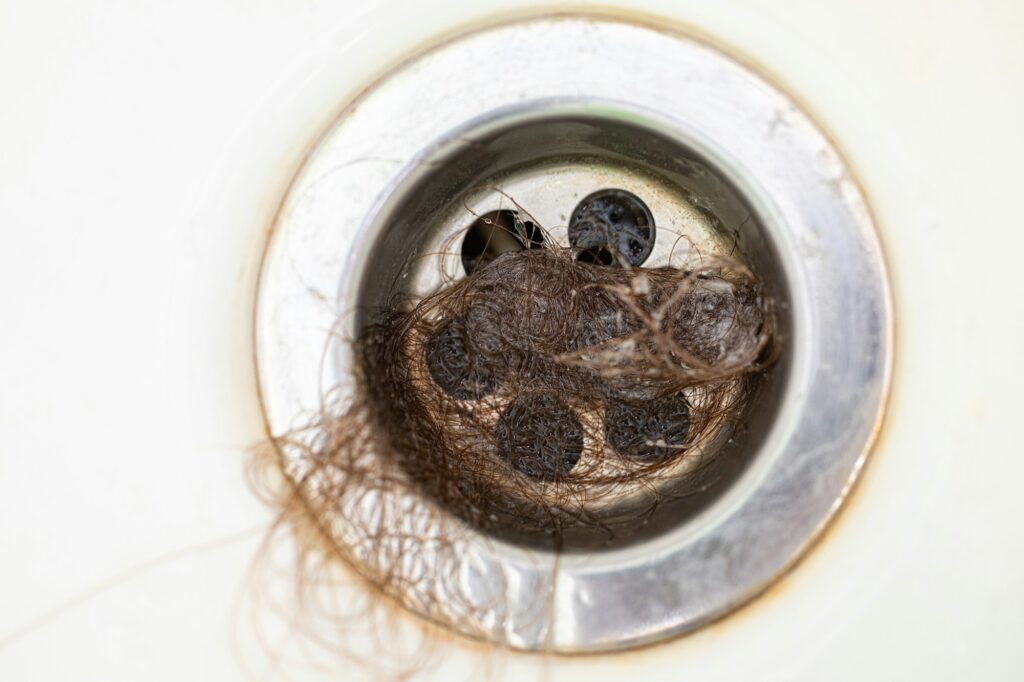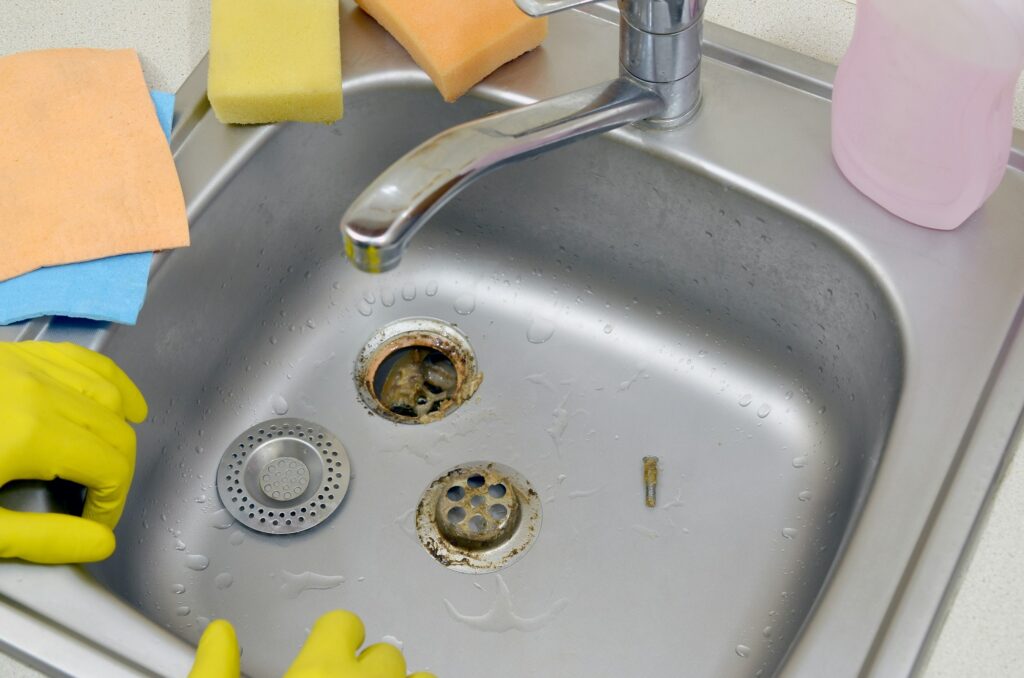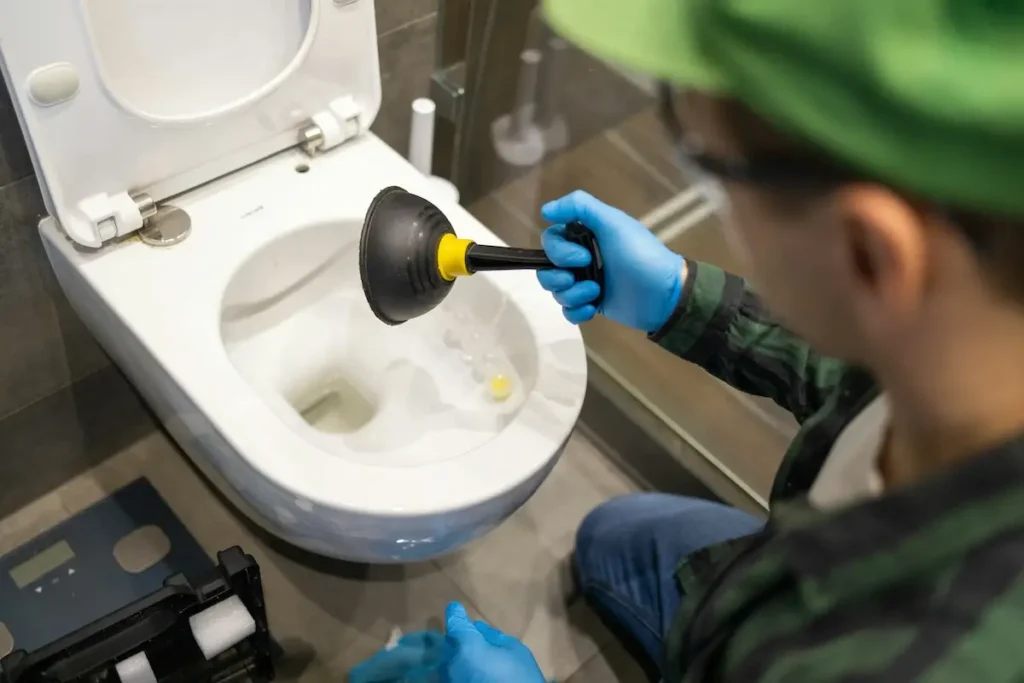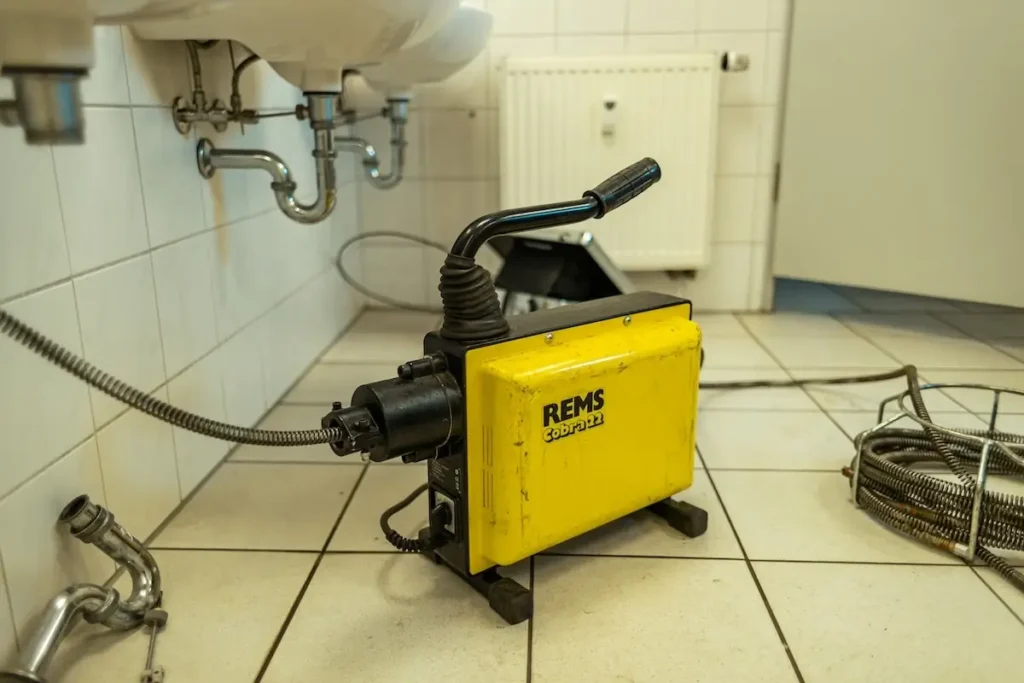Drain clogged? Your Ultimate Guide to Prevention and Fixing
Almost everyone has experienced the drain being clogged: you just want to quickly wash your hands, wash the dishes or take a relaxing bath after a long day, but suddenly you are faced with a basin full of stagnant water. Clogged drains in the kitchen, bathroom, shower, or bathtub can be more than just a minor inconvenience – they can mess up the entire daily routine and even lead to unpleasant odors.
The reasons for a clogged drain are many and can range from simple blockages caused by hair or food debris to more complex problems that are harder to fix. But whether it's a superficial blockage or a deeper blockage, the fear of what's coming next is always present. The good news? There is hope and numerous solutions that can help.
In this post, we'll take you on a journey through the world of clogged drains. Not only do we offer insight into the most common causes of this everyday problem, but we also present a variety of proven solutions – from simple home remedies that everyone has at hand, to professional tips when nothing else helps. Whether you're struggling with a clogged kitchen drain, the shower has stopped draining, or the water is standing in the bathtub, our guide will help you solve the problem effectively and efficiently.
In this post, we will not write about clogged toilets, as a separate post has been written for this extensive topic.
This is why blockages occur
A clogged drain is more than just an annoying obstacle – it's a sign that there's a problem somewhere between the visible drain and the hidden pipes below us. But before we get into solving the problem, it's crucial to understand the root causes. So why do drains clog in the first place? The answer often lies in our daily use and the things that unintentionally (or sometimes intentionally) find their way down our drains.
The most common reasons in detail
Drain clogs sink: hair, soap residue and small objects
In the sink, hair and soap residues are the most common causes of blockages. These can accumulate in the bathroom sink, where they often bond with small items such as earring backs or razor blade blades. In the kitchen, food residues and fats lead to blockages, with coffee grounds and starchy foods such as potato peels being particularly problematic.

Drain clogged Shower: The fight against hair and product residues
In the shower, it is mainly hair that combines with soap and product residues and forms dense, hard-to-remove clumps. Residues from shower gels and shampoos can make the situation worse by sticking the hair and narrowing the drain. You can read more about clogged shower drains in the article on the topic of clogged shower drains.
Drain clogged Bathtub: toys, hair and oil residues
Similar to the shower, hair and soap residue can also clog the bathtub drain. In addition, there are small toys that children like to let play in the tub and that can then block the drain unnoticed. Bath salts and oils that do not dissolve completely also contribute to constipation.
drain clogged in the Kitchen: The enemy called fat
In the kitchen, grease and oil are the biggest enemies of any drain. They harden and trap other waste materials such as food scraps and even paper. Improper disposal of food scraps, such as vegetable fibers or bones, can also quickly lead to constipation. Cleaning the kitchen drain is therefore an important activity that should be firmly integrated into everyday life.
The Unexpected Troublemakers: Small Items
Not to forget small objects that either accidentally or through children's curiosity get down the drain. From lost earrings to toy cars to cotton pads, such items are not meant to flow through our pipes and can lead to serious blockages.

Estimated frequency of constipation causes
In-depth knowledge for preventive measures
By becoming aware of these causes, we can take targeted measures to keep our drain free of clogs. This knowledge not only enables us to deal with existing problems, but also to proactively take measures that minimize the risk of future blockages. Whether through regular cleaning, the use of drain sieves or the correct disposal of grease – every little knowledge and action can make a big difference.
Cleaning the drain: home remedies for first aid
Thanks to some proven home remedies, you can tackle many types of blockages independently and in an environmentally friendly way. Find out how you can remedy this with simple means from your household.
Hot water and washing-up liquid against grease
One of the quickest and most effective ways to clean grease blockages, especially in the kitchen, is to combine hot water and dish soap. Simply boil hot water, mix with a few drops of dish soap and carefully pour it down the drain. This mixture effectively dissolves grease and flushes it through the pipes. However, you should exercise caution with PVC pipes, as hot water can damage them. Caution is also advised when handling boiling water to avoid burns.
Baking Soda and Vinegar – A Chemical Reaction for Free Pipes
The combination of baking soda and vinegar uses a natural chemical reaction to loosen minor blockages. Sprinkle half a cup of baking soda directly down the drain, followed by half a cup of vinegar. Close the drain briefly and rinse with hot water after about 30 minutes. This method is environmentally friendly and safe for most pipe materials. However, keep in mind that it may not be effective for severe constipation and should not be combined with chemical cleaners.
Coke and baking powder – A surprisingly strong duo
Less well known, but often just as effective, is the use of cola in combination with baking soda to combat constipation. The acid in the cola, together with the baking soda, works against constipation. Pour half a cup of baking soda followed by a bottle of cola down the drain and let it sit overnight. Rinse with hot water the next day. Be sure to rinse thoroughly to avoid sticky residue.
Baking soda and vinegar – A strong team
Baking soda in combination with vinegar is another effective method, especially for organic constipation. Add half a cup of baking soda to the drain, followed by half a cup of vinegar, and let the mixture take effect. After covering the drain for about an hour, rinse with hot water. This environmentally friendly solution is particularly helpful for a wide range of blockages, but again, do not mix with chemical cleaners and limit use to occasional cases so as not to damage the pipes.
Summary and precautions
These home remedies offer practical and environmentally friendly first aid options for clogged drains. They are easy to use and can effectively help with various constipations. Nevertheless, it is important to choose the application wisely and be aware of the possible risks. In the case of recurrent or severe blockages, the advice of a professional is essential to avoid damage and find a permanent solution. With these tips, you'll be well equipped to respond to the next blockage in a way that benefits both your household and the environment.
Chemical Pipe Cleaners – A Double-Edged Sword
If home remedies are not enough, you could consider chemical pipe cleaners. They offer an effective and quick solution to stubborn blockages due to their strong chemical action. However, their use should be chosen carefully, as they have both advantages and disadvantages.
Application and benefits
Chemical pipe cleaners are easy to use and often work faster than home remedies because they are specifically designed to unclog difficult clogs such as hair, grease, and other debris. They are available in various formats and do not require any additional tools for application.
Risks of pipe cleaner
Despite their efficiency, chemical cleaners pose risks to health and the environment. They can cause skin irritation and respiratory problems, and are harmful to aquatic ecosystems. In addition, there is a risk that they can damage pipes if used frequently. Constipations that are difficult to dissolve can persist despite their strong effect.
Careful handling recommended
Chemical pipe cleaners should be considered as a last option after trying safer methods. Their use requires caution and strict adherence to safety instructions to avoid health risks and environmental damage. In the case of severe blockages, it is often more advisable to consult a professional to solve the problem without risk to the plumbing or the surrounding area.
It is best not to clean a drain with chemical agents, as these often cause other problems. We recommend calling an expert in case of stubborn blockages.
Comparison Table of Cleaning Methods
| Cleaning | Effectiveness | Cost | Time exposure | Environmental friendliness |
|---|---|---|---|---|
| Hot water and washing-up liquid | 🟢🟢🔵🔵🔵 | 💲 | ⏳ | 🌍🌍🌍🌍 |
| Baking powder and vinegar | 🟢🟢🟢🔵🔵 | 💲💲 | ⏳⏳ | 🌍🌍🌍🌍🌍 |
| Coke and baking powder | 🟢🟢🔵🔵🔵 | 💲💲 | ⏳⏳⏳⏳ | 🌍🌍🌍 |
| Baking soda and vinegar | 🟢🟢🟢🔵🔵 | 💲💲 | ⏳⏳ | 🌍🌍🌍🌍🌍 |
| Chemical pipe cleaners | 🟢🟢🟢🟢🟢 | 💲💲💲 | ⏳ | 🔴🔴🔴🔴🔴 |
Nächste Schritte bei hartnäckigen Abflussverstopfungen
Wenn Hausmittel, Heißwasser, Backpulver-Essig-Mischungen oder chemische Rohrreiniger nicht den gewünschten Erfolg bringen, stehen noch mechanische Hilfsmittel und die Option der professionellen Hilfe zur Verfügung. Dieser Abschnitt beleuchtet, wann es Zeit ist, auf diese Maßnahmen zurückzugreifen und wie man dabei am besten vorgeht.
Mechanische Methoden: Spirale und Saugglocke
Zwei bewährte Werkzeuge in der Bekämpfung von Rohrverstopfungen sind die Spirale und die Saugglocke. Diese Hilfsmittel bieten eine physische Lösung, indem sie direkt die Blockade im Rohr angehen.
- Saugglocke: Ideal für oberflächliche Verstopfungen. Durch das Erzeugen eines Vakuums und anschließender Druckbewegung kann die Verstopfung gelöst werden.
- Rohrspirale: Für tiefer sitzende Blockaden. Die Spirale wird in das Rohr eingeführt und durch Drehbewegungen greift sie die Verstopfung physisch an, um sie zu lockern oder herauszuziehen.


Drain clogged – professional solutions to stubborn problems
Now that home remedies and mechanical tools such as the spiral and suction cup have failed, it's time to consider more serious measures. In this section, you will learn when the use of professional help becomes unavoidable and how you should go about it in order to find effective and sustainable solutions to your constipation problem.
Recognizing when professional help is needed
Despite all efforts, there are situations in which blockages are so deep or so persistent that simple home remedies or even the use of spirals and suction cups are not sufficient. This can be especially the case if the drain is regularly clogged. This indicates deeper problems in the pipe system. But even if you need immediate help without having to test different methods or order tools, professional pipe cleaning is the solution. In many cases, professional pipe cleaning companies are with you after just a few hours, sometimes even less than an hour, and will find a direct and sustainable solution to your problem.
The advantages of professional pipe cleaning if your drain is clogged
The decision to call in a professional has numerous advantages. In our video on the subject of pipe cleaning, you can see how you can recognize a good company in your area and what services it does for you:
- Effectiveness: Professional pipe cleaners have the necessary equipment and expertise to unblock even the most stubborn blockages.
- Prevention: In addition to acute problem solving, professionals also help prevent future blockages by thoroughly inspecting and cleaning the entire pipe system.
- Time saving and safety: A professional service can not only save you time, but also avoid the risk of damage to the pipe system that can occur due to improper self-experimentation.
How do you choose the right service provider?
Unfortunately, there are always black sheep and fraudsters among pipe cleaning companies. That's why it's important to be attentive when choosing a service provider. You should consider the following points when choosing:
- Reputation: Look for a service provider with good reviews and positive feedback from previous customers.
- Transparency in costs: A reputable provider will always provide a clear breakdown of costs before they start working.
- Emergency service: Check if the service provider offers a 24-hour emergency service to respond quickly to urgent issues.
In our magazine article "Find reputable pipe cleaning nearby" we explain in more detail what you should look out for when choosing a company.
Cons and concerns
While professional help offers many advantages, there are also some disadvantages to consider:
- Cost: Professional services are more expensive than DIY solutions. It is important to have a clear understanding of costs in advance. Reputable companies can usually tell you your costs on the phone.
When the expert has to get involved
For deep-seated or particularly stubborn blockages, professional pipe cleaning is often the most effective way. A professional can not only solve the current problem, but also prevent potential future blockages. Choosing the right service provider is crucial for a successful and cost-efficient solution. Despite the higher costs compared to home remedies, professional pipe cleaning offers an investment in the long-term health of your pipe system and the prevention of recurring problems.
FAQ: Drain clogged
In the case of severely clogged drains, mechanical cleaning with a drain spiral or a suction bell is recommended first. If this is not enough, home remedies such as a mixture of baking soda and vinegar or chemical pipe cleaners can help. In the case of stubborn blockages, a professional pipe cleaning service should be called in.
If the water stops draining, a suction cup or a mixture of hot water and dish soap can help solve the problem. For deeper blockages, a drain cleaning spiral can be effective. If these measures do not work, a specialist should be contacted.
Baking soda and vinegar are usually safe for most pipe systems and provide an environmentally friendly method of clearing blockages. However, they should not be used in combination with chemical cleaners and may not be sufficient for severe blockages.
Häufige Ursachen für verstopfte Abflüsse sind Haare, Seifenreste, Fett, Essensreste und kleine Gegenstände, die in den Abfluss gelangen. In Küchen sind insbesondere Fett und Speisereste problematisch, während in Badezimmern Haare und Seifenreste oft die Hauptursache sind.
Vorbeugende Maßnahmen umfassen die regelmäßige Reinigung der Abflüsse mit heißem Wasser, die Verwendung von Abflusssieben, um Haare und größere Partikel aufzufangen, und das Vermeiden von fettigen oder stärkehaltigen Substanzen im Abfluss. Eine monatliche Reinigung mit Backpulver und Essig kann ebenfalls helfen, Verstopfungen zu verhindern.
A professional drain cleaner should be called if home remedies and mechanical methods are not successful, if blockages occur regularly, or if you need immediate help. Professionals have the necessary equipment and expertise to effectively solve stubborn or deep-seated blockages.
Chemical pipe cleaners can be effective for stubborn blockages, but they pose risks to health and the environment. Their use should be done with caution, as they can damage pipes if used frequently. It is advisable to use chemical cleaners only as a last option.
Effective home remedies for clogged drains are hot water and dish soap, a mixture of baking soda and vinegar, as well as cola and baking soda. These remedies are environmentally friendly and help with mild constipation by dissolving grease and debris.
Result
After exploring the depths of clogged drains and presenting a variety of solutions, from simple home remedies to professional support, we hope you're now better prepared for the next clog. We have seen that the causes are varied and can range from hair and food particles to fat accumulations and small objects. The good news is that there is a solution to every problem.
Important findings for a clog-free home:
- Prevention is key: Regular cleaning and mindfulness of what goes down your drain can prevent many problems.
- Home remedies are often effective: Simple solutions such as hot water with dish soap, baking soda and vinegar or even cola can be effective for mild constipation.
- Professional help when needed: For stubborn or recurrent blockages, it is advisable to call in professionals who can not only solve the problem but also prevent future blockages.
Your next step:
If, despite all precautions and attempted solutions, you encounter a problem that you cannot fix yourself, do not hesitate to use our company search. Our magazine not only provides you with further guides, but can also help you find the right professional for your specific situation. In our Germany-wide network of professional companies, you will also find the perfect regional expert for your problem.
Stay proactive and informed
A clogged drain does not have to mean a disaster. With the right knowledge and the right tools, you can solve many problems yourself or prevent them effectively. And for everything else, we're just a contact away. Let's work together to make clogged drains just a minor inconvenience that can be fixed quickly and efficiently.
